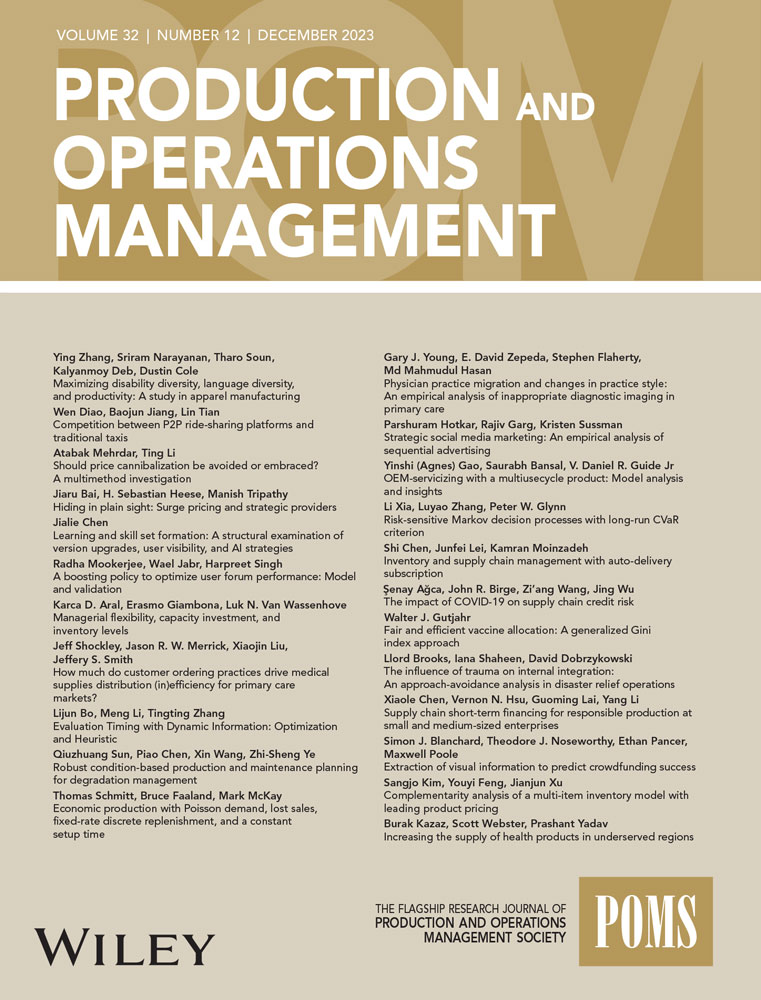EXPRESS: Framing Inclusive Practice Options for Financial, Operational, and Community Outcomes
IF 4.8
3区 管理学
Q1 ENGINEERING, MANUFACTURING
引用次数: 0
Abstract
While the operations management literature has addressed inclusive business models for large organizations, there has been less focus on how small and medium sized enterprises (SMEs) include vulnerable end-users when they are subject to industry constraints and are not able to redesign their business models. In such cases, organizations face variable profits based on the socioeconomic status (SES) of the end-user. We introduce the Inclusive Practice Options (IPO) framework to explain how, within the constraints of existing business models, SMEs can balance financial, operational, and community-related priorities. Vulnerable end-users should be considered in the end-user mix of all three priorities and may contribute to the overall fiscal solvency of the organization because while servicing these end-users may generate less revenue per end-user, they also may require less processing time, lower processing variability, and fewer denied or missed payments contributing to a more stable profits on average. To present this framework, we first describe the conceptual and theoretical underpinnings of Inclusive Practice Options. We then delineate the three dimensions of the IPO framework: comprehensive financial performance, operational fairness, and community lift. We describe how the IPO framework can be applied to stakeholder management, market segmentation, and resource allocation. We provide an illustrative mental health practice case for additional context. Finally, we discuss future research directions and the implications of viewing operations management through this multidimensional lens.EXPRESS:为财务、运营和社区成果制定包容性实践方案
虽然运营管理文献探讨了大型组织的包容性商业模式,但较少关注中小型企业(SMEs)在受到行业限制、无法重新设计商业模式的情况下如何将弱势最终用户纳入其中。在这种情况下,组织会根据最终用户的社会经济地位(SES)而面临不同的利润。我们引入了 "包容性实践选择"(IPO)框架,以解释中小型企业如何在现有商业模式的限制下,平衡财务、运营和社区相关优先事项。弱势最终用户应在所有三个优先事项的最终用户组合中加以考虑,并可为组织的整体财政偿付能力做出贡献,因为尽管为这些最终用户提供服务可能会减少每个最终用户的收入,但他们也可能需要更少的处理时间、更低的处理变异性以及更少的拒付或漏付,从而使平均利润更加稳定。为了提出这一框架,我们首先介绍了全纳业务选择的概念和理论基础。然后,我们划分了 IPO 框架的三个维度:综合财务绩效、运营公平性和社区提升。我们介绍了如何将 IPO 框架应用于利益相关者管理、市场细分和资源分配。我们提供了一个心理健康实践案例,以提供更多的背景信息。最后,我们讨论了未来的研究方向,以及从这一多维视角看待运营管理的意义。
本文章由计算机程序翻译,如有差异,请以英文原文为准。
求助全文
约1分钟内获得全文
求助全文
来源期刊

Production and Operations Management
管理科学-工程:制造
CiteScore
7.50
自引率
16.00%
发文量
278
审稿时长
24 months
期刊介绍:
The mission of Production and Operations Management is to serve as the flagship research journal in operations management in manufacturing and services. The journal publishes scientific research into the problems, interest, and concerns of managers who manage product and process design, operations, and supply chains. It covers all topics in product and process design, operations, and supply chain management and welcomes papers using any research paradigm.
文献相关原料
| 公司名称 | 产品信息 | 采购帮参考价格 |
|---|
 求助内容:
求助内容: 应助结果提醒方式:
应助结果提醒方式:


